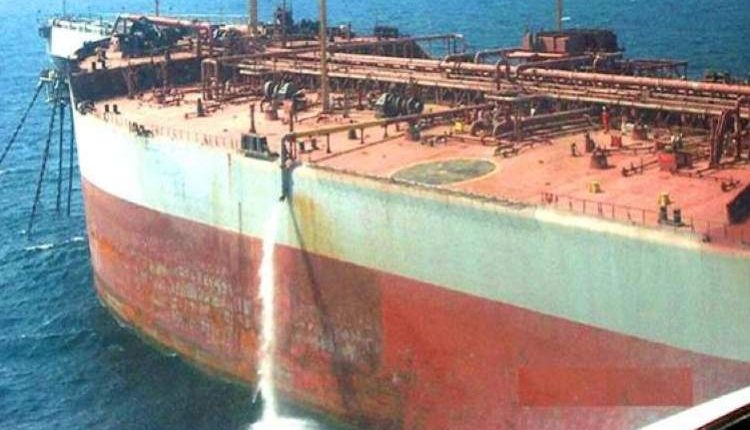UN Continues to Ignore Its Obligations for Saving Oil Tank, Safer
The Supervisory Committee for the Execution of the Urgent Maintenance Agreement and the Comprehensive Evaluation of the Floating Oil Tank Safer, has renewed its strong dissatisfaction with the continued disregard by the United Nations of its obligations towards the reservoir. The United Nations Office for Project Services (UNOPS) continued to disavow the implementation of the urgent maintenance agreement and the comprehensive evaluation of the floating tank Safer, which was signed in November 2020.
In a statement, the committee warned of the repercussions of the deterioration of the situation of the Safer Reservoir after nearly seven years without any maintenance of the reservoir, which makes the level of an environmental disaster in the Red Sea more significant than ever, which will affect Yemen and neighboring countries for many years.
The UNOPS submitted its implementation plan in violation of the agreement last May; completely ignoring the agreement and its obligations towards the Safer reservoir, despite knowing that the status of the reservoir could no longer tolerate further delays.
While the committee called for the immediate implementation of the agreement, it holds the UNOPS fully responsible for any leak or explosion of the reservoir, and the resulting unprecedented environmental disaster in the Red Sea. “The responsibility to squander the funds allocated to implement the agreement, which the United Nations Office for Project Services refuses to disclose and its fate, despite the multiple demands directed at it to work on the principle of transparency before public opinion.”
UN spent more than 3 and a half million dollars out of the maintenance budget of more than 9 million dollars and no work was carried out.
Sana’a is keen to implement the maintenance agreement:
The head of the Safer Maintenance Committee, Ibrahim Al-Seraji, confirmed that Sana’a had no interest in obstructing the agreement and maintenance, denying that there were any intentions to use the ship for a military purpose, and that these allegations were false. Al-Seraji pointed out that there was a proposal that the oil inside the ship be sold and payment is paid to the Central Bank in Sana’a under the supervision of the United Nations to pay the salaries of the state employees, but the coalition party refused this and wanted the payment to be given to the mercenaries in Aden. “This is kind of crazy, if they think we’ll hand them the ship and give them money to fight us with,” he said.
He asserted that they always have access to the ship and get updates through their technical teams. He expressed his fear that deterioration of the ship is getting worse and technical teams would not be able to fix it.
Al-Seraji indicated that there is a tendency by the coalition countries and their mercenaries to let the situation of the Safer ship deteriorate, as nearly 700 workers, the crew of the ship, are employed by the Safer Company in Ma’rib. Meanwhile, the company reduced this staff to only seven, and weeks ago the company prevented the ship’s captain from returning to it. This is an escalating step to harm the ship’s status quo. Also, the Safer Company in Marib, which was providing diesel to the ship and catering to the staff on board so that they could stay on board, stopped supplying it with diesel five months ago, wondering: “Doesn’t this indicate recklessness or deliberate attempts to damage the situation? the ship?”
Regarding the budget specified for maintenance, Al-Seraji explained that since the beginning of the agreement, they demanded the United Nations to disclose it, but it refused, adding: “But I received information that the budget was greater than $9 million, and the spokesman for the Secretary-General of the United Nations said several months ago that more than 3 and a half million dollars have been spent from it.”
Britain is politicizing the Safer:
Al-Seraji pointed out that the British ambassador wants to escalate Safer’s situation , and wants to politicize it, pointing out that after signing the agreement, he wrote a tweet saying: “It is too late for maintenance,” and he used the same phrase when we granted visas to maintenance experts.
“The United Nations has been addressed about the agreement signed with it, and a translated statement has been sent in all languages to all diplomatic missions in the United Nations and to all members of the Security Council, but not everyone wants to listen to our voice.
Resolve the crisis before disaster strikes:
Al-Seraji stressed that the solution is for the United Nations not to be blind to the real situation of the agreement, calling on the United Nations to review the agreement signed by its Office for Services and Projects, to review the plan it submitted, and to return to the agreement that will lead to alleviating the disaster.
Al-Seraji concluded, saying: “I see that members of the Security Council are not on the same page about the Safer crisis.” “For months, we have been reading the same statements, as the members of the Security Council have been asking us to grant entry visas to United Nations experts in order to maintain the ship before contracting with them or provide us with their names, how entry can be granted without names, we want them to go back to reality.”

